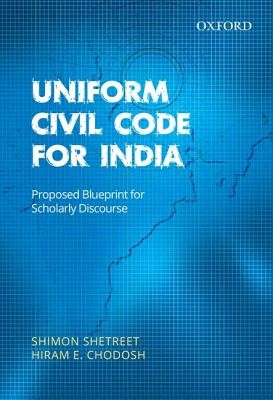
- We will send in 10–14 business days.
- Author: Shimon Shetreet
- Publisher: Oxford University Press, USA
- ISBN-10: 0198077122
- ISBN-13: 9780198077121
- Format: 14.3 x 22.6 x 2.2 cm, hardcover
- Language: English
- SAVE -10% with code: EXTRA
Reviews
Description
Article 44 of The Constitution of India, provides that 'The State shall endeavor to secure for the citizens a Uniform Civil Code throughout the territory of India.' Even after more than six decades, this anticipated code has not been developed or implemented. This book provides a blueprint for alternative frameworks and courses of action, drawing on lessons from comparative context to develop a Uniform Civil Code for India. It explores the interplay between issues of law, culture, and religion in light of various intra-community and inter-community disputes. The book proposes a series of guidelines and considerations to inform this process. The first guideline urges that the process of preparing and implementing a Uniform Civil Code should be the function of the Legislature. The Courts can resolve certain specific points but the comprehensive code is a legislative function and not for judicial resolution. The second guideline suggests the parallel application of civil and
religious law. The securing of a Uniform Civil Code must not negate the possibility of citizens availing themselves of religious law-if they so wish. The third guideline advises a gradual application of a Uniform Civil Code. The development of the code should be done topic by topic, chapter by chapter. The fourth guideline is to deploy tools of mediation in both the formation of the code and its implementation. This mediation should take on two forms - intercommunity mediation and individual mediation. The first of these two relates to a dialogue between the communities of India, to advance an agreement upon the substantive provisions of the Uniform Civil Code. The second relates to mediation between individuals, in occasions where dispute arises in the realm of personal law.
EXTRA 10 % discount with code: EXTRA
The promotion ends in 21d.01:06:57
The discount code is valid when purchasing from 10 €. Discounts do not stack.
- Author: Shimon Shetreet
- Publisher: Oxford University Press, USA
- ISBN-10: 0198077122
- ISBN-13: 9780198077121
- Format: 14.3 x 22.6 x 2.2 cm, hardcover
- Language: English English
Article 44 of The Constitution of India, provides that 'The State shall endeavor to secure for the citizens a Uniform Civil Code throughout the territory of India.' Even after more than six decades, this anticipated code has not been developed or implemented. This book provides a blueprint for alternative frameworks and courses of action, drawing on lessons from comparative context to develop a Uniform Civil Code for India. It explores the interplay between issues of law, culture, and religion in light of various intra-community and inter-community disputes. The book proposes a series of guidelines and considerations to inform this process. The first guideline urges that the process of preparing and implementing a Uniform Civil Code should be the function of the Legislature. The Courts can resolve certain specific points but the comprehensive code is a legislative function and not for judicial resolution. The second guideline suggests the parallel application of civil and
religious law. The securing of a Uniform Civil Code must not negate the possibility of citizens availing themselves of religious law-if they so wish. The third guideline advises a gradual application of a Uniform Civil Code. The development of the code should be done topic by topic, chapter by chapter. The fourth guideline is to deploy tools of mediation in both the formation of the code and its implementation. This mediation should take on two forms - intercommunity mediation and individual mediation. The first of these two relates to a dialogue between the communities of India, to advance an agreement upon the substantive provisions of the Uniform Civil Code. The second relates to mediation between individuals, in occasions where dispute arises in the realm of personal law.


Reviews